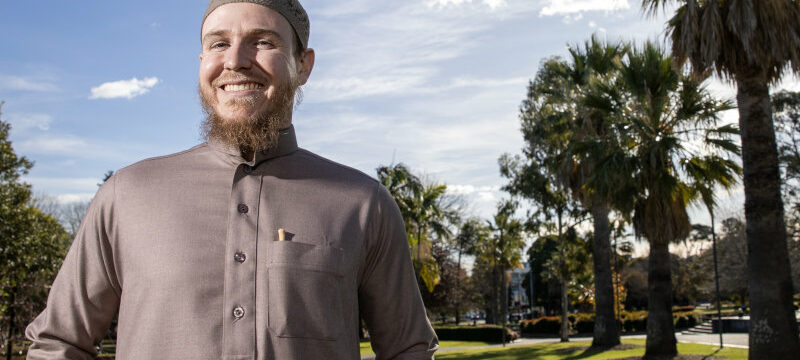Save articles for later
Add articles to your saved list and come back to them any time.
Myles Hembrow’s first exposure to Islam was on one of his deployments to Oman during his service with the Royal Australian Navy.
He vividly recalls Eid al-Fitr, or the Feast of Breaking the Fast, where Muslims break their fast before performing evening prayers.
This put him on a path to Islam.
Myles Hembrow at Enmore Park with his prayer mat and wearing a thobe, which is typically seen at mosques during Eid.Credit: Dylan Coker
“What blew me away was the hospitality of the people. We were the foreign defence force in the country, but they invited me to sit down and eat with them.”
“I couldn’t comprehend how welcoming everyone was. It was something that always stayed in the back of my mind.”
Hembrow is one of a small but growing number of Westerners who have “reverted” to Islam, according to the Australian Journal of Islamic Sciences.
It is an even smaller group of people to have done so outside of marriage or independent of a relationship, as he did almost a year ago.
He explained, “normally the word is convert, but in Islam it’s called revert because you’re reverting back to what’s considered natural. There’s a concept that everyone comes from Islam.”
Hembrow was born in Australia to Caucasian parents and attended a Catholic school. He was not averse to religion growing up, he says, but the faith never felt right.
“Something about the Trinity didn’t sit well with me … I feel like I thought quite Islamically before, but now I have a framework and an anchoring point.”
Almost half of the ADF’s active operations are in predominantly Muslim countries, and it is clear that this is something Hembrow wrestles with.
Myles Hembrow served in the Middle East with the Royal Australian Navy.Credit: Dylan Coker
“I am comfortable with my individual efforts in the Middle East. We were doing anti-piracy, anti-drug-related operations as part of a joint taskforce near the Gulf of Oman. I can’t speak for what else happens, I’m not on the ground in a lot of countries, but it’s something I think about often.
”It’s a very difficult topic and I think it’s something I’m going to continue to ponder on as we go forward. But I am proud of my service, I did it with the right intention.”
Hembrow observes the five pillars of Islam, including praying a minimum of five times a day, fasting during Ramadan and performing both obligatory and non-obligatory charity.
About the charity, he says: “That’s not [necessarily] financial, it can be anything. Giving someone your time, giving my mother a phone call. I never used to speak to my biological father but now Islamically it’s a very important thing to have that kinship.
“[My faith] helped me build a lot of bridges that weren’t there before.”
To develop his understanding of the religion, Hembrow attends Islamic Sciences classes two to three times a week. He also learns Arabic at the University of Sydney while working full-time.
On the social front, he has found a community of Muslim people who deepen his love for the faith.
“I honestly get bear hugs. The big Arab boys, they pull me in. Every single time I meet someone who’s Muslim, who finds out I’m Muslim, I get special treatment. I don’t feel like I deserve it, but they are phenomenal people.”
How does he know when someone is Muslim? “Every conversation you have with someone, they will drop a praise to God. They are very quick to attribute anything positive about themselves to God. And they’re mostly open to talking about it too; I haven’t met anyone who’s ashamed of it.”
The way people engage with their Muslim identity varies from culture to culture, depending on whether the person practising is from an African, Middle Eastern or South Asian background.
Hembrow acknowledges that each country has its own spin on the rituals and celebrations, but he believes the faith, rules and pillars remain the same.
“No cultural practices dilute the religious fundamentals. Because I’m white, I can’t speak for other cultures, but I guess it comes down to what you cook for an iftar meal, whether you go to the mosque for iftar, or whether you have it at home with your family,” he says.
Hembrow is joining Muslims around the world to celebrate Eid al-Adha, also known as the Feast of Sacrifice. It is one of the most important Islamic festivals because it is a recognition of faith. Muslims have been commemorating the prophet Ibrahim’s willingness to sacrifice his own son at the will of Allah since June 28.
The Morning Edition newsletter is our guide to the day’s most important and interesting stories, analysis and insights. Sign up here.
Most Viewed in National
From our partners
Source: Read Full Article


